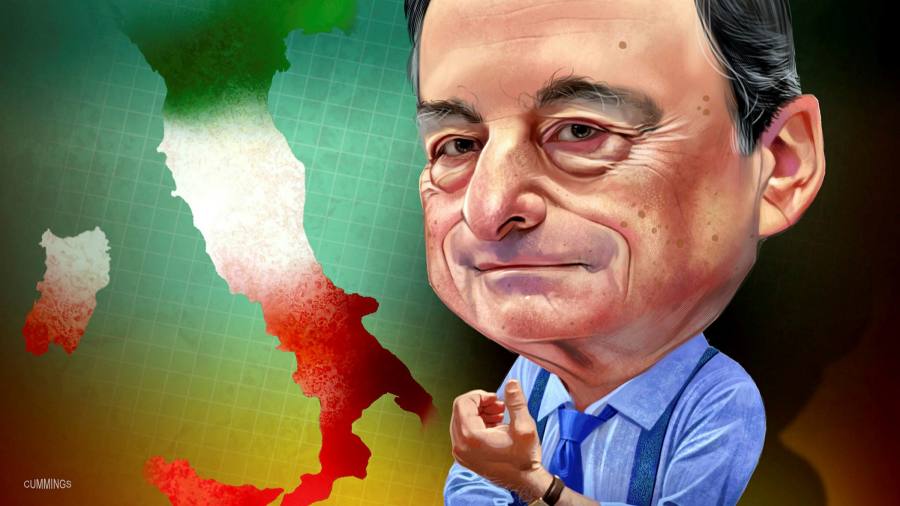[ad_1]
Shouldering responsibility after a tragedy is something that Mario Draghi, the former president of the European Central Bank, was forced to learn at an early age.
At 15 he lost his father, a German-speaking Italian executive who had drilled a steely work ethic into his son. Soon afterwards he lost his pharmacist mother, too, leaving the teenager responsible for the family’s affairs. “I came back from holidays at the sea with a friend,†Draghi later recalled. “He went home and could do what he liked. I, by contrast, was confronted with a stack of letters that I had to deal with, bills that had to be paid.â€
In his 60s, Draghi as ECB chief fought an economic crisis so great it threatened to break apart the eurozone. He left the job a hero, and with the affectionate nickname “Super Marioâ€. Now, at the age of 73, Draghi faces a task that is likely to be equally Herculean. Lauded as the man who saved the euro, he has been asked to try to save Italy from its worst crisis since the second world war.
With Italy’s coalition government having collapsed last month, Draghi was this week summoned by President Sergio Mattarella to attempt to form a government of national unity to marshal pandemic recovery plans. The reaction in some quarters was little short of euphoric, yet also reflected fear at what might transpire if he failed. Massimo Giannini, a prominent political columnist, called Draghi, a former Bank of Italy governor who once worked for Goldman Sachs, Italy’s “last hopeâ€.Â
A friend of Draghi who spoke with him in the days before the announcement said his strong sense of public service made it “impossible for him to turn down†the request to help his country and the EU in the crisis.
Educated at a Jesuit school in Rome, Draghi shone as a pupil and was a basketball fanatic whose idol was Bill Bradley, the New York Knicks star. In 2009 an Italian basketball foundation gave him an award for being an “important ambassador†for the sport. Unpledged to any political party, he is more partisan in matters of football. A fan of AS Roma, he described Francesco Totti, the club’s legendary former captain, as “a philosopher of footballâ€.
After graduating in economics at Rome’s La Sapienza university, he earned a PhD at the Massachusetts Institute of Technology under the guidance of the Nobel Prize-winning Franco Modigliani. Married with two children, Draghi had until now been in a relaxing semi-retirement at his home in the small Umbrian town of Città della Pieve.
His ascension is not assured. Draghi is consulting the leaders of Italy’s political parties to see if he can find a majority to support him in parliament. Failure would probably result in snap elections.
He is, according to those who know him well, a reluctant player. “He does not want to stay in politics for the long term, and he starts with a lot of moral authority, so he can deal well with the more pressing challenges and help Italy and Europe,†said VÃtor Constâncio, who was the ECB’s vice-president under Draghi’s leadership.
The pandemic has further weakened an economy that has barely grown in real terms for two decades. Government debt is expected to rise to almost 160 per cent of gross domestic product this year. The economy shrank 8.8 per cent last year in a record postwar recession.
Last year, in one of the few speeches Draghi has given since leaving the ECB in November 2019, he compared Europe’s rebuilding from the pandemic to the aftermath of the second world war. He said government debt levels would be high for a long time, but they would only be sustainable if “good debt†was “used for productive purposes†instead of “bad debt†being used for unproductive purposes.
Enacting the reforms that Draghi repeatedly urged governments to make as a central banker — a step that has eluded countless Italian prime ministers — will not be easy. If Draghi succeeds in forming a government, he will have to adjust to the rancorous, unstable world of Italian politics, a vastly different environment to the tightly choreographed world of central bank press conferences.
“He was communicating to the market at the ECB, but as prime minister he will have to communicate to citizens and find a different voice,†says Jörg Asmussen, who was on the ECB executive board during Draghi’s presidency.
Lorenzo Codogno, a former Italian Treasury head, says that running a technocratic government is “an almost impossible task in Italy†and it would present “a minefield†for Draghi. “It will undoubtedly be problematic to find cross-party support on structural reforms, although Draghi’s skills and experience may well do the trick.â€Â
Many believe that no other Italian is capable of commanding the same level of respect across the political spectrum at home, and in the EU. “Normally, Europe is led by Germany and France and a combination of [Angela] Merkel and [Emmanuel] Macron, but if Draghi becomes Italian prime minister European politics might shift into more of a triangle,†Asmussen says.
Lorenzo Bini Smaghi, who worked with Draghi at the Italian Treasury and the ECB, says his “greatest achievement was not so much to say that he would do ‘whatever it takes’ to save the euro, but it was getting Angela Merkel to say nothing and remain supportive — this shows he is very skilful politicallyâ€. Inside the bear pit of Italian domestic politics, and faced with a country deeply frustrated with its leaders, these skills will be tested to their limits.
[ad_2]
Source link





